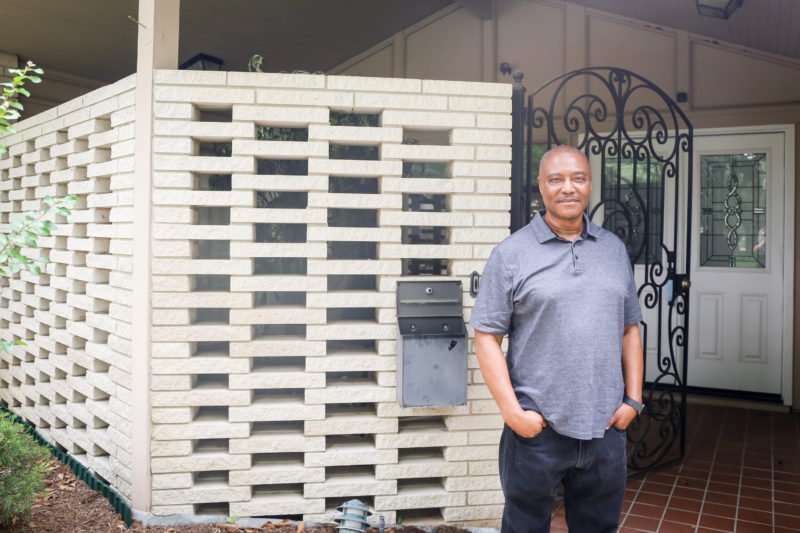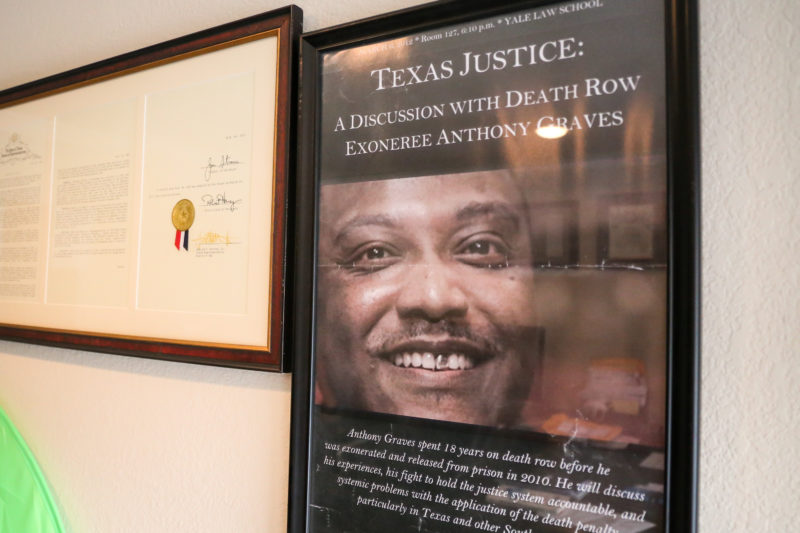Texas Lawmakers Want to Make Single Eyewitness Testimony No Longer Grounds for Death Penalty
By Madi Donham
Reporting Texas

Anthony Graves stands in front of his home in Houston on May 1, 2021. After being on death row for 18 years for a crime he did not commit, Graves was exonerated on October 27, 2010. Alyssa Villarreal/Reporting Texas
Police were called on Aug. 18, 1992, to a burning home in Somerville, where they found the bodies of a family of six. After Robert Carter was arrested for the crime, he named an accomplice: 26-year-old Anthony Graves of Brenham
A jury later sentenced the two men to death.
Naivety and faith kept Anthony Graves optimistic on death row after Carter, who was married to Graves’ cousin at the time, implicated him in the murders. How could an innocent man be sentenced to death for a crime he did not commit based on one man’s lie? But according to Texas law, single eyewitness testimony is enough to convict someone of a crime, including capital murder.
Carter’s last statement from the execution gurney on May 31, 2000, was that Graves was innocent and that he had lied in court. Graves was exonerated and released from prison on Oct. 27, 2010, after 18 years in prison.
“Eyewitness testimony without corroborating evidence is just bad — period. It’s very damaging because if you can’t back it up, we’re talking about someone’s life and someone’s freedom,” Graves said.
“There’s no way we should be reaching a guilty verdict when we’re just playing the guessing game,” he added, “and that’s what our criminal justice system does.”
Now, a state representative wants to make it impossible to hand down a death sentence in Texas based on the testimony of a single witness without corroborating evidence. Supporters of the change say it’s dangerous to sentence someone to death row based on eyewitness testimony alone. Prosecutors, meanwhile, say they doubt it’s actually a problem and that the proposal could be a slippery slope that leads to micromanaging their work.
Nearly 5,640 individuals are currently wrongfully convicted in Texas, according to an estimate by the Innocence Project of Texas, which seeks to exonerate the wrongly convicted through DNA testing and advocates for reforms to the criminal justice system to prevent future injustice.
The Innocence Project has helped to exonerate nine wrongfully convicted death row inmates who were sentenced on the basis of eyewitness testimony — including one from Texas.

Important events in the life of Anthony Graves are framed and hung up on the wall of his home in Houston on May 1, 2021. “All these awards make me feel like the 18 and a half years I was in jail were worth something,” Graves said. Alyssa Villarreal/Reporting Texas
Jay Coons, a clinical and assistant professor of criminal justice at Sam Houston State University’s College of Criminal Justice and retired police officer, supports the proposed legislation and said he’s concerned that the criminal justice system can take someone’s life based on flawed methodology.
Eyewitness testimony used to be the gold standard, Coons said, but it’s now suspect at best because of confabulation — in which gaps in someone’s memory are unconsciously filled with real and imagined information under stress — and tunnel vision, which narrows a witness’ version of a story due to incomplete details and stress.
“If our criminal justice was perfect and did not make mistakes, I would support the death penalty because of what I’ve seen. Unfortunately, it’s not, and we do make mistakes and we obviously can’t replace someone’s lost years.”
Rep. Steve Toth, R-The Woodlands, said innocent lives continue to be at risk if his legislation doesn’t pass. He served on the House Criminal Jurisprudence and Corrections Committee in 2013 when he learned about 40 individuals who had been wrongfully convicted for a variety of reasons, such as mistaken eyewitness identification, inadequate defense or flawed forensic science.
“Our founding fathers never intended for our right to life to be treated so carelessly,” Toth said.
His bill would prohibit the death penalty in cases where a conviction is based solely on the testimony of one eyewitness. However, a defendant could still be sentenced to life imprisonment based on a single eyewitness.
The bill has been approved by the House Criminal Jurisprudence Committee — chaired by Rep. Nicole Collier, D-Fort Worth, who co-authored the bill with Toth — and sent to the Calendars Committee.
Texas is one of 27 states that still enforce the death penalty, and it leads the nation with 570 executions since 1976, according to the Death Penalty Information Center, which claims that eyewitness testimony is the single greatest cause of wrongful convictions in the U.S. criminal justice system.
Police officers and district attorneys should be seeking justice, not convictions, Coons said. “It’s not about winning, it’s about seeking the truth. Sometimes we get police officers and district attorneys who forget that.”
Kelly Blackburn, chief of the trial bureau of the Montgomery County District Attorney’s Office, has worked in the criminal justice field for more than 20 years and agrees that justice should be the focus of every attorney and officer. But he said their work should not be limited by legislators.
The bill won’t change the way district attorneys prosecute death penalty cases across the state because they almost always have more than a single eyewitness to support their case, Blackburn said.
“Anthony Graves’ prosecutor’s actions were unspeakable,” Blackburn said, “but with legislative change like this I can’t say that there wouldn’t be a possibility of hurting those of us who do this job right. Telling ethical and moral prosecutors what they can and can’t present is a problem,” he added.
Although prosecutors can no longer use co-conspirators, like Carter, to testify against a defendant, adding additional restrictions to eyewitness testimony would reduce the state’s incarceration rate of 891 per 100,000 people by an estimated 30%, Graves said.
The incarceration rate in Texas is the seventh highest in the U.S. behind states like Oklahoma, Louisiana and Mississippi, which have incarceration rates that surpass 1,000 per 100,000 people.

Anthony Graves sits at the desk of his home office in Houston on May 1, 2021. Alyssa Villarreal/Reporting Texas
Since his release from death row a decade ago, Graves has dedicated his life to making a difference in the criminal justice system. He founded the Anthony Graves Foundation to raise awareness about criminal justice reform, published a biography, “Infinite Hope,” and travels the U.S. to share his story when he’s not working as a community liaison at the Harris County Public Defender’s office.
Graves said the criminal justice system doesn’t look at a black man as a whole person and treat him as innocent until proven guilty. He filed a grievance with the State Bar of Texas, which disbarred Carter’s attorney in 2016 for concealing evidence, presenting false testimony and lying during his trial.
“A man lied and cost me 18 and a half years of my life because of your rules and your laws, and I’m asking you to support this bill and stop killing people behind the testimony of a single eyewitness,” Graves said when asked what he would tell lawmakers as they weigh House Bill 77.
“I want to help people who don’t understand why this system never seems to work in their favor, and that if you persist in pursuing the law, it does work in your favor — sometimes it just takes a long time,” Graves said.